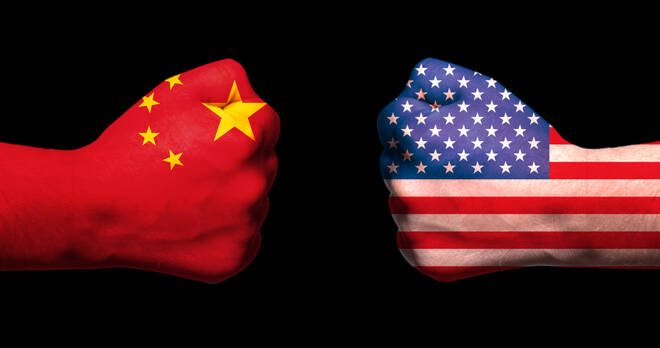Advertisement
Advertisement
Asian Shares Lower after Trump Comments, Veiled Threat from China, Legal Move by Huawei
By:
On Monday, President Trump said the U.S. was “not ready” to strike a deal with China, before adding he expected one in the future. He also said tariffs on Chinese imports could go up “substantially.” Traders read the comments as bearish because they certainly don’t indicate both sides are moving closer to a trade deal.
The major Asia/Pacific stock indexes are under pressure early Wednesday as investors react to the late session weakness from Wall Street on Tuesday, and fresh concerns over the escalating U.S.-China trade dispute.
Although some traders are blaming the lack of progress over trade talks for capping gains, the weakness is generally being attributed to subtle digs from both economic powerhouses.
On Monday, President Trump said the U.S. was “not ready” to strike a deal with China, before adding he expected one in the future. He also said tariffs on Chinese imports could go up “substantially.” Traders read the comments as bearish because they certainly don’t indicate both sides are moving closer to a trade deal.
China surprised traders with a veiled threat concerning rare earth minerals, a crucial component to the U.S. technology industry. CNBC reported that Chinese President Xi Jinping recently visited rare earth mining and processing facilities, adding to speculation that Beijing could make the minerals more expensive or unavailable if the trade war continues to expand.
In the cash market at 04:00 GMT, Japan’s Nikkei 225 Index is trading 21007.59, down 252.55 or -1.19 percent. Hong Kong’s Hang Seng Index is at 27271.18, down 119.63 or -0.44 percent and South Korea’s KOSPI Index is at 2021.06, down 27.77 or -1.36 percent.
The two markets mostly affected by U.S.-China trade tensions, Australia and China were also lower. In Australia, the S&P/ASX 200 Index is trading 6434.10, down 50.70 or -0.78 and in China, the Shanghai Index is at 2906.82, down 3.09 or -0.11.
The selling pressure has also spread overseas with the U.S. futures markets feeling some early heat.
At 04:04 GMT, the benchmark June E-mini S&P 500 Index futures are trading 2795.75, down 9.25 or -0.33%. The blue chip June E-mini Dow Jones Industrial Average futures contract is at 25295, down 74 or -0.29% and the technology-driven June E-mini NASDAQ-100 Index is at 7253.50, down 41.75 or -0.57%.
China’s Veiled Rare Earth Minerals Threat
The technology sector was surprised on Tuesday when news that China could use its dominance in rare earth minerals as a weapon in the trade war hit the market. There was some speculative selling after a Chinese official warned that products made the materials should not be used against China’s development. Some read this as a veiled threat.
The Chinese tabloid Global Times also reported Tuesday that China is “seriously considering” limiting rare earth exports to the United States. However, traders downplayed the news because it was not an official comment from the Chinese government. Nonetheless, it is something that should be watched because China is likely to get more creative if they are forced to retaliate against additional U.S. moves.
Rare earth imports are a relatively small part of the $420 billion U.S. goods deficit with China, but their worth far outstrips their dollar value. The materials are critical in the creation of such things as iPhones, electric vehicles and advanced precision weapons.
Huawei Makes Legal Move
Early Wednesday, Huawei took the next step in its legal case against the U.S. government in a bid to expedite the process. In March, Huawei filed a lawsuit against the U.S. alleging a law that bans government agencies from buying the Chinese technology giant’s equipment is unconstitutional.
According to reports, Huawei is filing what’s known in legal terms as a “motion for summary judgment.” It’s a request that the court rule in Huawei’s favor as a matter of law. Huawei wants a section of the U.S. National Defense Authorization (NDAA) scrapped.
The news adds further to the technology dispute between the United States and China, which is a separate issue than the trade dispute. If Huawei doesn’t have access to key American technology like components or software for its smartphones, it could be very damaging for its business.
About the Author
James Hyerczykauthor
James Hyerczyk is a U.S. based seasoned technical analyst and educator with over 40 years of experience in market analysis and trading, specializing in chart patterns and price movement. He is the author of two books on technical analysis and has a background in both futures and stock markets.
Advertisement
